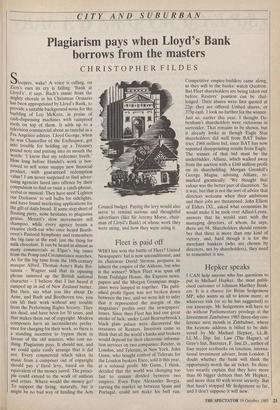Fleet is paid off
WHO has won the battle of Fleet? United Newspapers' bid is now unconditional, and its chairman David Stevens prepares to inherit the empire of the Aitkens, but who is the winner? When Fleet was spun off from Trafalgar House, the Express news- papers and the Morgan Grampian maga- zines were lumped in together. The publ- sihed profit figure was not broken down between the two, and we were left to infer that it represented the margin of the magazines' profits over the newspapers' losses. Since then Fleet has had one great stroke of luck: under Lord Bearverbrook's black glass palace were discovered the treasures of Reuters. Investors came to think that all the world's banks and brokers would depend for their electronic informa- tion services on two companies: Reuter, in London, and Telerate, in New York. John Gunn, who bought control of Telerate for the London brokers Exco, sold it this year, at a colossal profit. Mr Gunn, I think, decided that the world was changing too fast to remain divided between two empires. Even Pope Alexander Borgia, carving the market up between Spain and Portugal, could not make his bull run.
Competitive empire-builders came along, as they will to the banks: watch Quotron. But Fleet shareholders are being taken out before Reuters' position can be chal- lenged. Their shares were first quoted at 22p: they are offered United shares, or 375p cash. I look no further for the winner. Just so, earlier this year, I thought De- benham's shareholders were victorious in surrender. That remains to be shown, but it already looks as though Eagle Star shareholders did well from BAT Indus- tries' £968 million bid, since BAT has now reported disappointing results from Eagle. The winner of that bid must be the underbidder, Allianz, which walked away from the auction with a £160 million profit on its shareholding. Morgan Grenfell's George Magan, advising Allianz, re- marked gnomically: 'We thought that valour was the better part of discretion.' So it was, but that is not the sort of advice that directors welcome when their ambitions and their jobs are threatened. John Elliott of Elders IXL, asked what economies he would make if he took over Allied-Lyons, answers that he would start with the managing directors, of whom, he says, there are 94. Shareholders should remem- ber that there is more than one kind of victory, and, hard though it is for the merchant bankers (who are chosen by directors, not by shareholders), they need to remember it too.


















































 Previous page
Previous page